Overview
This article explores nine family therapy interventions that are instrumental in facilitating trauma recovery. It emphasizes the significance of personalized approaches to healing within family dynamics. Each intervention, including Cognitive Behavioral Therapy and Emotionally Focused Therapy, is backed by research that showcases improvements in communication, emotional support, and overall mental health outcomes. These tailored interventions empower families to navigate their recovery together, fostering a sense of unity and understanding.
Have you ever felt overwhelmed by your past? Recognizing the importance of personalized healing can be the first step toward a brighter future. As we delve deeper into these therapeutic methods, remember that seeking support is a courageous act that can lead to profound transformation.
Introduction
Navigating the complex landscape of trauma recovery can feel daunting for families, often leaving them feeling isolated and overwhelmed. Have you ever felt this way? By exploring tailored family therapy interventions, this article unveils a variety of strategies designed to foster healing and resilience within familial relationships.
What if the key to overcoming past traumas lies not just in individual therapy, but in the collective strength of family support? As we explore this further, discover how these innovative approaches can transform the recovery journey, empowering families to rebuild their connections and thrive together.
The Emerald Couch: Tailored Family Therapy for Trauma Recovery
At The Emerald Couch, we create a compassionate and inclusive atmosphere for individuals navigating the challenging journey of trauma recovery. Have you ever felt overwhelmed by your past? By personalizing family therapy interventions to meet the unique needs of each household, we ensure that everyone feels acknowledged and supported. This customized approach not only fosters healing but also empowers families to collaborate effectively on their path to recovery.
Research shows that participating in family therapy interventions significantly enhances treatment engagement. In fact, every session attended is associated with a 1.4-fold increase in the likelihood of completing treatment. Such tailored family therapy interventions are essential, as they help cultivate a shared narrative of distress and improve communication and coping skills among family members.
As Dr. Katie R Berry wisely notes, "Involvement of relatives in treatment is associated with reduced dropout and improved attendance in outpatient environments." This underscores the importance of family therapy interventions as personalized support for families at The Emerald Couch, which is a cornerstone of effective healing practices. Together, we can nurture deeper connections and among loved ones. Embrace the journey towards healing with us—your path to recovery starts here.
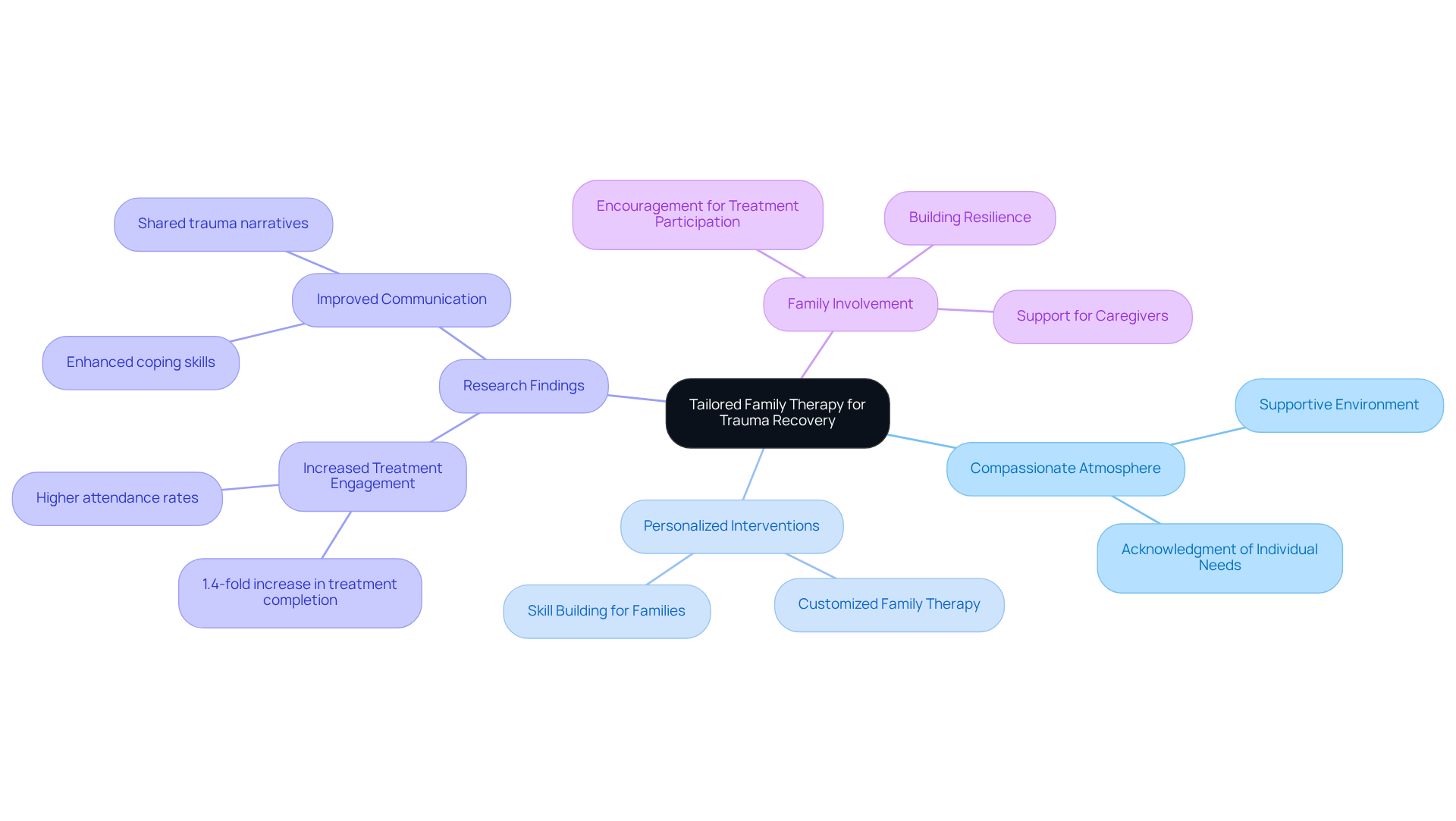
Cognitive Behavioral Therapy (CBT): Restructuring Thoughts to Heal Trauma
Cognitive Behavioral Therapy (CBT) plays a vital role in helping individuals identify and reshape negative thought patterns that often arise from trauma. Have you ever felt overwhelmed by your past? Within a relational counseling framework, family therapy interventions can utilize CBT to provide a space for family members to explore the connections between their thoughts, emotions, and actions. By working together to challenge these negative thoughts, families can implement family therapy interventions to create a nurturing environment that fosters healing and resilience.
Research suggests that CBT is particularly effective in domestic therapy settings, with studies revealing significant improvements in trauma-related symptoms. For instance, a meta-analysis found that trauma-focused CBT can lead to a remarkable 50% reduction in PTSD symptoms within just three months of treatment. Furthermore, families engaged in CBT frequently report enhanced communication and emotional support, both of which are essential for recovery.
This therapeutic approach, which includes , not only addresses individual struggles but also strengthens relational bonds, empowering families to confront their challenges together more effectively. As we explore this further, consider the potential of CBT to transform not just your personal journey, but also the dynamics within your family. Seeking help is a courageous step towards healing, and CBT may be the supportive path you need.
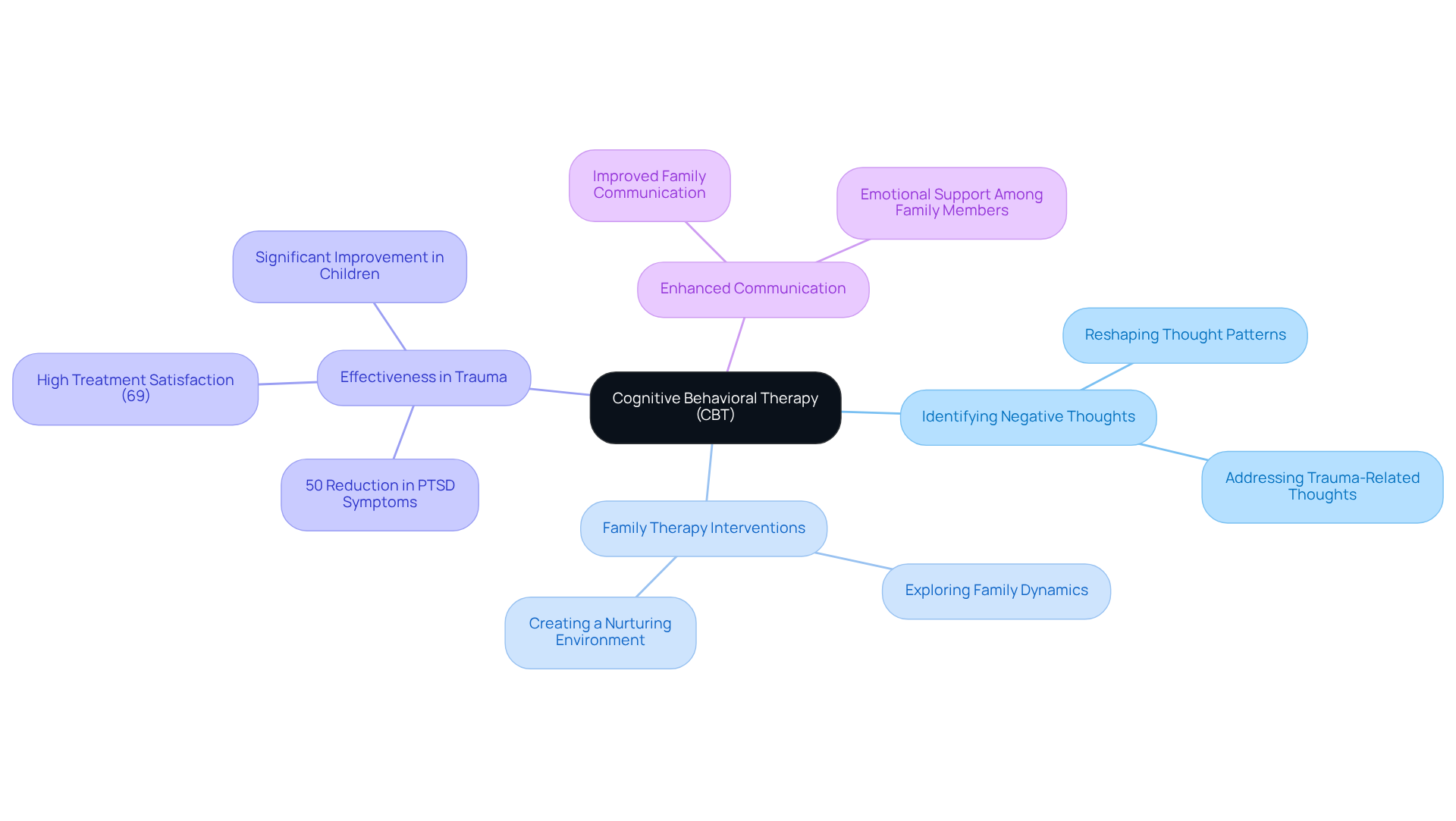
Narrative Therapy: Rewriting Family Stories for Healing
Narrative therapy offers a compassionate space for groups to share their experiences and transform their stories related to trauma. Have you ever felt overwhelmed by your past? By working together to explore these narratives, groups can uncover their strengths and resilience, enabling them to rewrite their collective story in a way that fosters healing and connection. This therapeutic method not only honors personal experiences but also strengthens relationships, creating a supportive environment for recovery.
Research shows that narrative therapy can significantly among participants, demonstrating its effectiveness in addressing distress. Successful family therapy interventions reveal that households engaging in this process often experience improved communication and a deeper understanding of one another, ultimately leading to a more unified dynamic. As therapists emphasize, the act of storytelling serves as a powerful tool in recovering from distress, allowing groups to reclaim their narratives and cultivate a sense of control over their healing journey. In addition to this, consider how sharing your story might empower you on your path to healing.
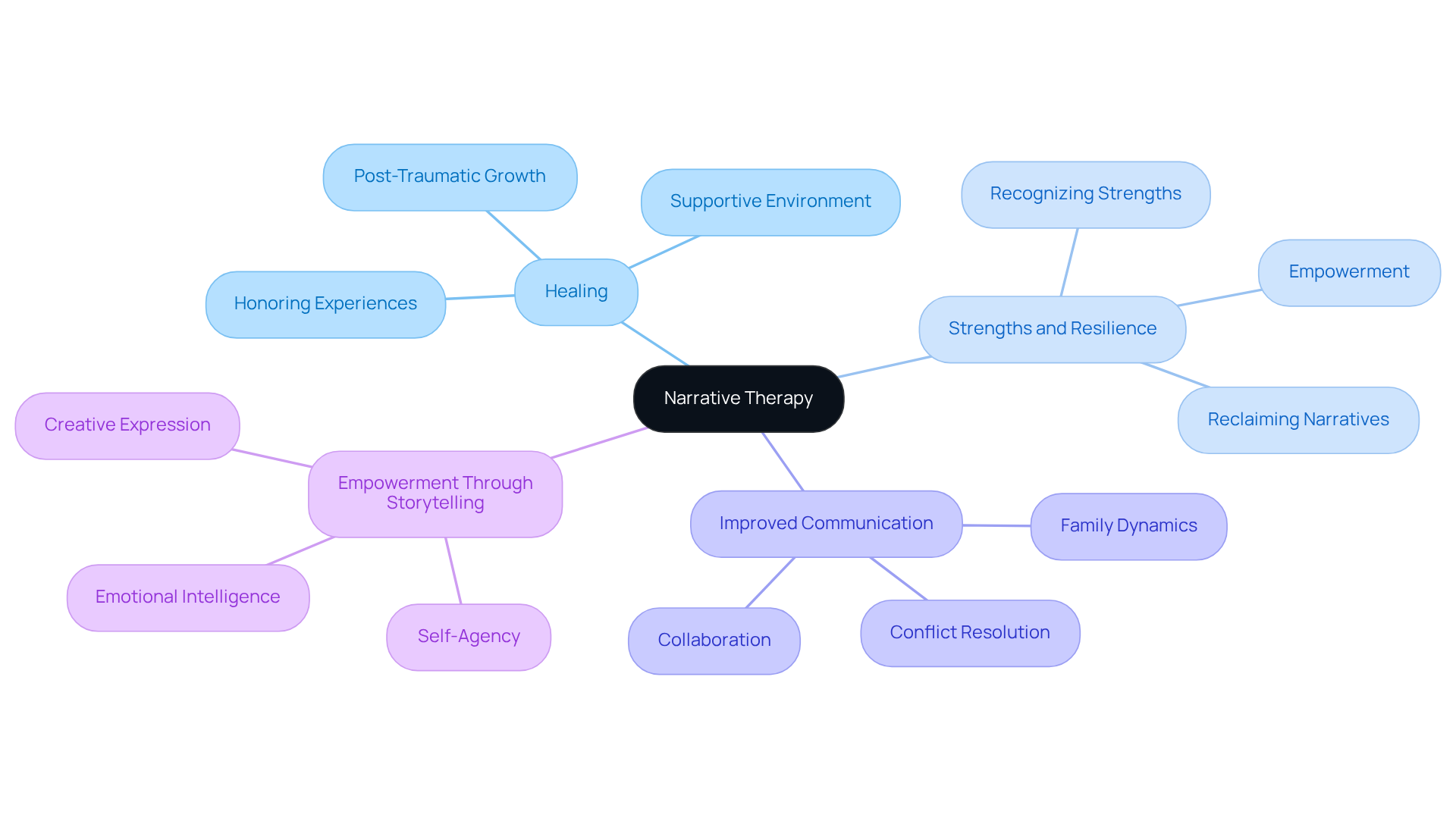
Play Therapy: Engaging Children in Trauma Healing
Play-based treatment serves as a vital intervention for children facing trauma, offering a safe haven where they can express their emotions and experiences through play. This compassionate approach allows children to convey feelings that may be difficult to articulate, which is essential for family therapy interventions to foster understanding and support among family members. Have you ever felt overwhelmed by your past? Research indicates that including parents in play sessions significantly enhances treatment outcomes. In fact, studies reveal that 71 percent of children who engage in play activities show progress in their emotional and behavioral challenges.
At The Emerald Couch, we embrace a collaborative approach to treatment planning. Your journey begins with an intake session, where we gather essential information to craft a tailored to your child's unique needs. This process involves defining what success looks like for your child and regularly checking in on progress toward those goals. It's important to recognize that the duration of treatment can vary for each child. While many begin to feel better within 4 to 6 weeks, the timeline for progress is distinct for every individual. The therapeutic journey not only aids in the child's recovery but also involves family therapy interventions that equip families with the tools to effectively support their children. As Dr. Paris Goodyear-Brown wisely notes, "Play is the primary language of a child, and for traumatized children especially, play is their talk and toys are their words." This insight underscores the significance of family therapy interventions through play in bridging communication gaps among family members, nurturing a stronger bond and deeper understanding.
Recent studies highlight the effectiveness of play therapy in home environments, illustrating its ability to address a wide range of challenges, including behavioral issues and emotional distress stemming from trauma. By engaging children in this imaginative mode of expression, families can collectively navigate the recovery journey with the help of family therapy interventions, ultimately leading to improved emotional health and resilience. As Kay Redfield Jamison poignantly stated, "Children need the freedom and time to play. Play is not a luxury. Play is a necessity." This reinforces the essential role of play in children's growth and healing. For families considering family therapy interventions, it is crucial to commit to the process, as the path toward recovery often requires time and patience.
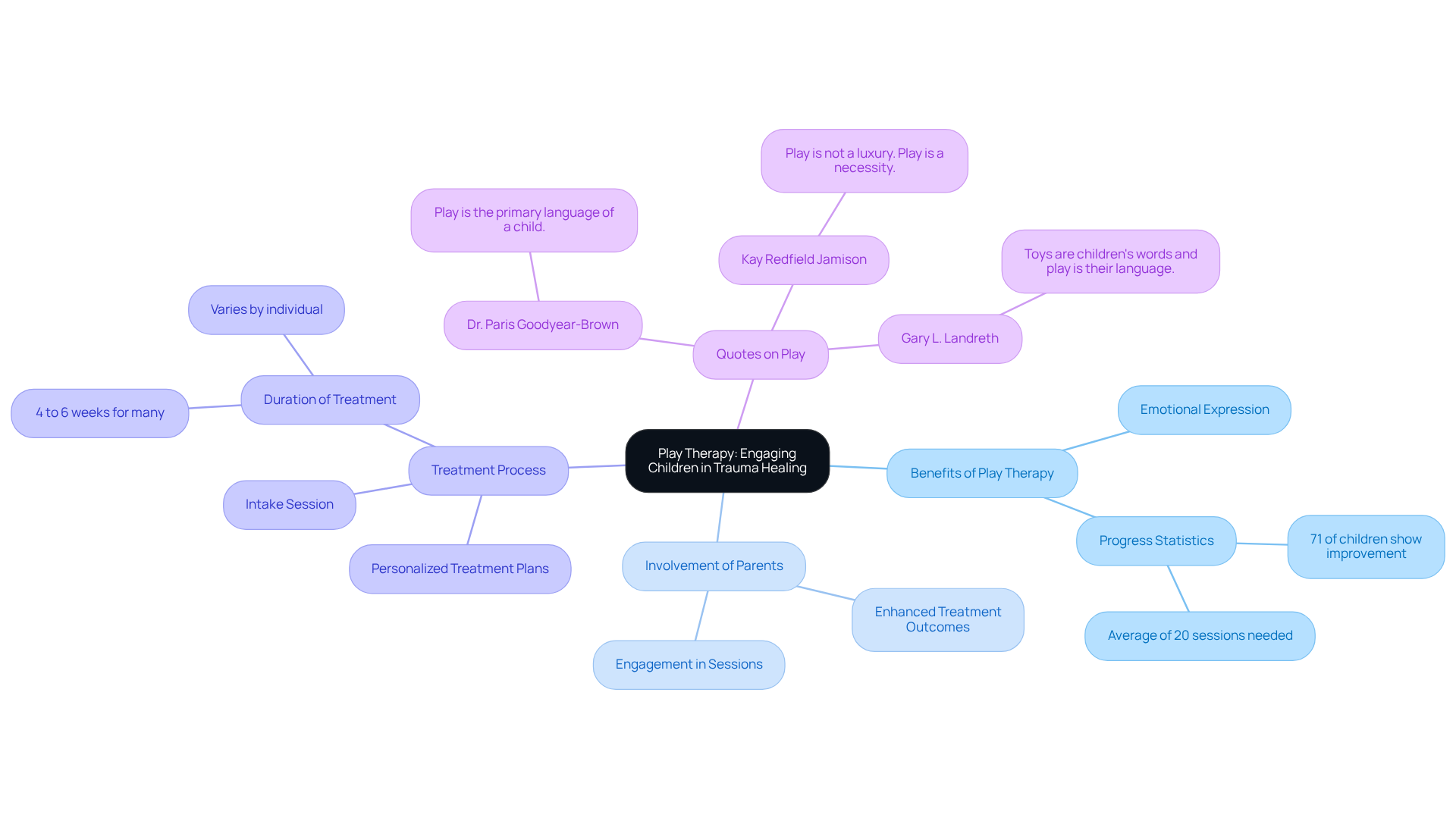
Family Systems Therapy: Understanding Dynamics to Heal Together
Systems therapy delves into the intricate relationships and dynamics within a household, focusing on the profound effects of trauma on these interactions. Have you ever felt overwhelmed by your past? By gaining insight into these dynamics, households can uncover patterns that may hinder recovery and work collaboratively towards fostering healthier interactions. This therapeutic method not only but also nurtures a sense of unity and collective responsibility in the recovery journey.
Research shows that effective family therapy interventions can significantly enhance mental health outcomes, addressing challenges such as depression, anxiety, and relationship conflicts. As households engage in this transformative process, they learn to navigate the complexities of their relationships, ultimately promoting resilience and emotional well-being.
Therapists emphasize that understanding relational dynamics is essential for recovery, as it empowers families to confront underlying issues and cultivate a supportive atmosphere conducive to healing. By prioritizing open communication and empathy, households can transform their interactions, paving the way for a more harmonious and supportive environment that encourages recovery together. In addition to this, consider how these changes can positively impact your family’s journey toward healing.
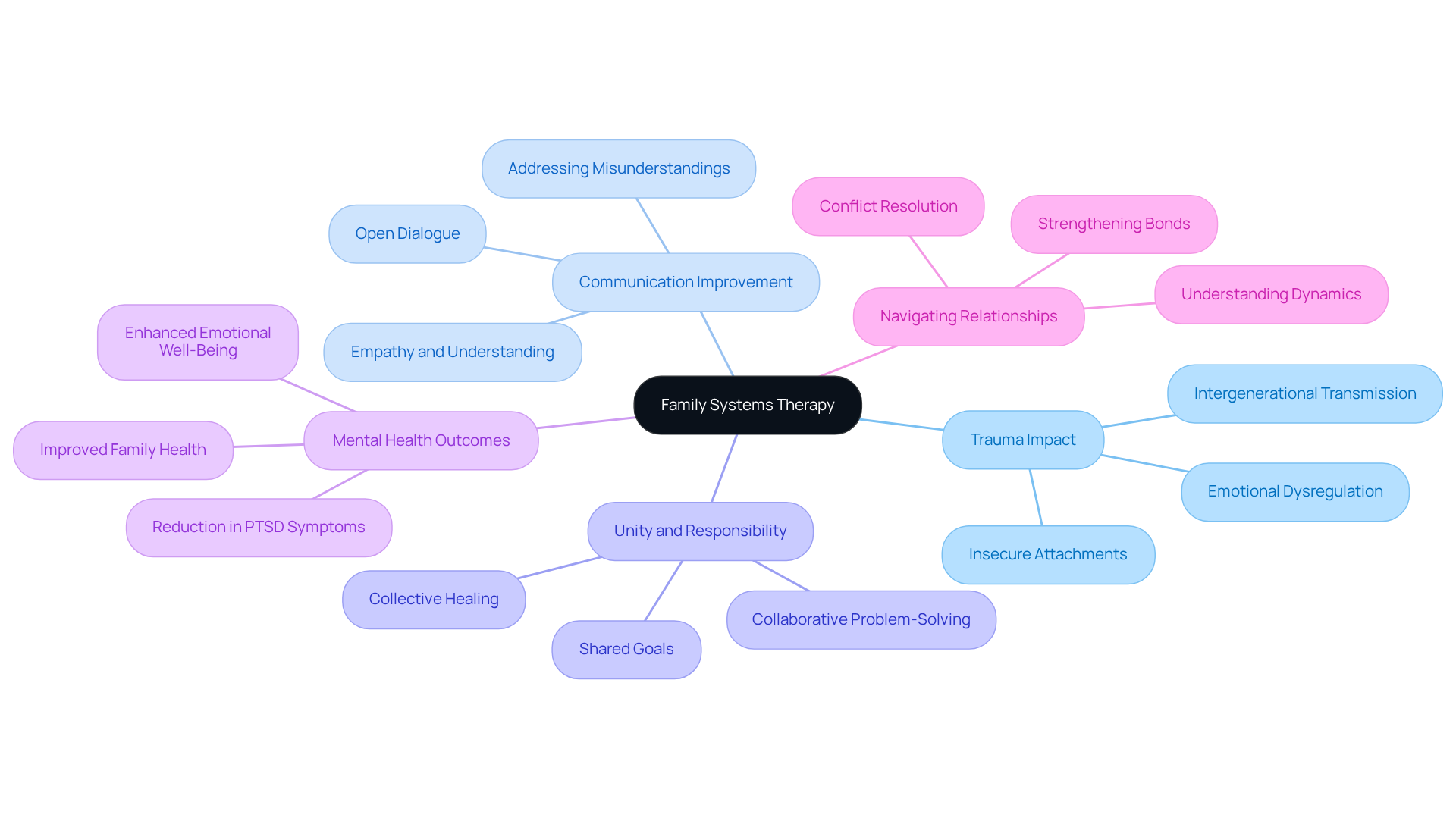
Emotionally Focused Therapy (EFT): Strengthening Family Bonds Post-Trauma
Emotionally Focused Therapy (EFT) serves as a powerful family therapy intervention aimed at enhancing emotional connections among family members, especially in the aftermath of trauma. This therapeutic approach emphasizes the importance of open dialogue and emotional expression, enabling families to reconnect and support one another throughout their healing journey. Have you ever felt overwhelmed by your past? For overachievers, who often grapple with feelings of anxiety, burnout, or being overwhelmed, EFT can create a vital space to address these challenges.
Research reveals that nearly 1 in 5 Canadian children face mental health issues, highlighting the urgent need for effective family therapy interventions. This method not only fosters individual recovery but also strengthens the collective resilience of families through family therapy interventions, creating a nurturing environment where members can navigate their emotional landscapes together. As we explore this further, by focusing on attachment dynamics, family therapy interventions such as EFT aid families in transforming their relationships, fostering a sense of safety and connection that is essential for overcoming distress.
As Sue Johnson, the founder of EFT, poignantly states, "If you tune into the emotions, oftentimes two minutes after the fight started—the fight ends up being about attachment issues." This insight underscores how the healing process is significantly enhanced when family members learn to express their emotions and needs. Ultimately, this leads to stronger, more unified family units.
Let us assist you in rediscovering security in your body, home, and life by acknowledging the rightful place of your pain in your past. Together, we can embark on this journey toward .
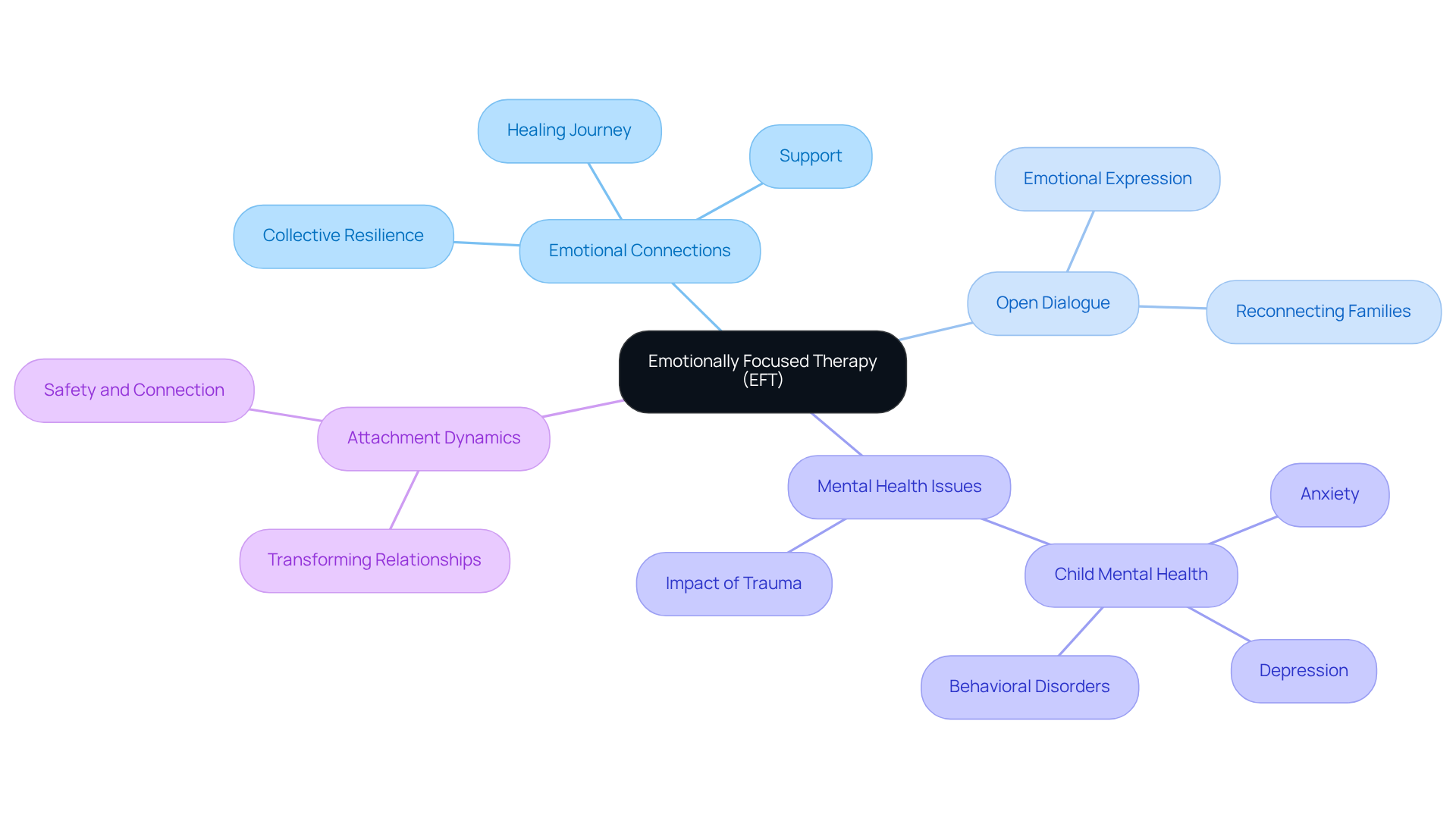
Art Therapy: Creative Expression for Family Trauma Healing
Art therapy presents families with a unique opportunity to express their emotions and experiences related to distress through various creative mediums. This is particularly valuable for those who find it difficult to articulate their feelings verbally. Have you ever felt overwhelmed by your past? Engaging in art together allows families to explore their trauma in a safe and nurturing environment, which can be enhanced through family therapy interventions, fostering healing and connection. As one art therapist insightfully noted, 'Creative expression can penetrate obstacles, enabling groups to tackle deeper issues that may be challenging to discuss.'
Recent studies affirm the effectiveness of artistic therapy in home settings, demonstrating its ability to enhance communication and emotional expression among family members. Families that participate in artistic counseling often report improved interactions, as they learn to navigate their challenges together, strengthening their bonds and fostering resilience. By weaving creative expression into family therapy interventions, practitioners can facilitate a deeper healing process, allowing families to rebuild their connections and grow together. In addition to this, consider how art could serve as a bridge to understanding and empathy within your own family.
Psychoeducation: Empowering Families with Knowledge on Trauma
Psychoeducation plays a vital role in equipping families with essential knowledge about distress and its psychological effects, especially through family therapy interventions. Have you ever felt overwhelmed by your past? By understanding the emotional and mental health impacts of adverse experiences, families can better support one another with family therapy interventions and recognize signs of distress. This awareness not only allows families to actively engage in their healing journey through family therapy interventions but also fosters a sense of empowerment as they navigate their challenges together.
Research indicates that , especially those involving psychoeducation, significantly enhance support interactions, leading to improved mental health outcomes for individuals who have faced distress. For instance, families participating in psychoeducational programs that include family therapy interventions report a 19.1% increase in mental health service utilization, underscoring the positive influence of knowledge on treatment engagement. As Karlyn Keller notes, 'Childhood adversity is among the most pertinent and important psycho-social elements influencing education today,' which emphasizes the importance of informed support from family members in the recovery process.
By normalizing emotional responses and providing coping strategies, family therapy interventions help families create a nurturing environment conducive to healing and resilience. Together, you can foster a supportive atmosphere that not only promotes understanding but also encourages growth. Consider exploring these resources further—your journey toward healing can begin today.
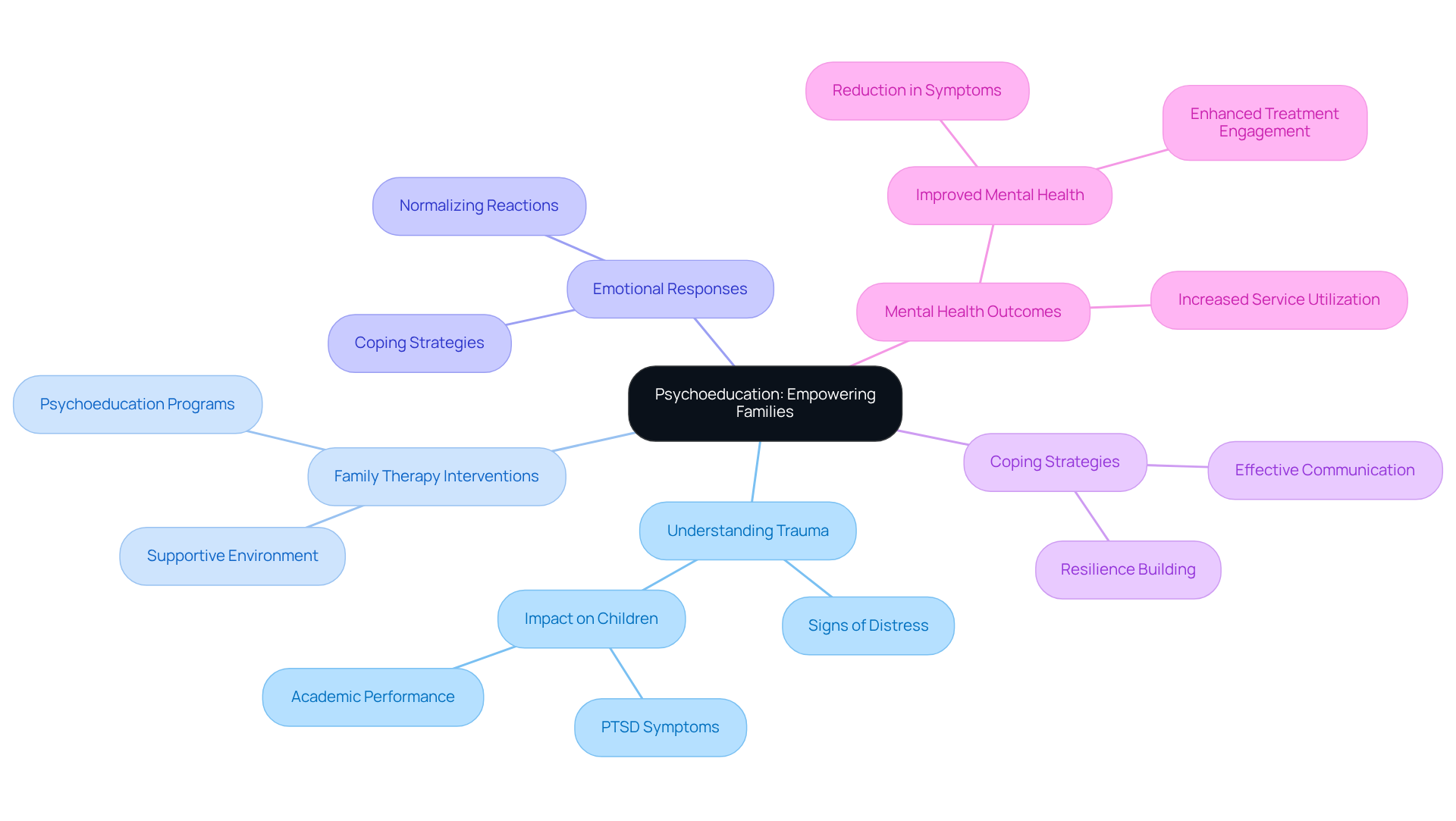
Mindfulness Techniques: Cultivating Calm in Family Therapy
Mindfulness methods, such as deep breathing and meditation, serve as valuable resources for those on the journey of trauma recovery. Have you ever felt overwhelmed by your past? By practicing mindfulness together, groups can cultivate a shared sense of calm and presence during therapy sessions. This collective approach not only helps manage stress and anxiety but also nurtures a supportive environment that fosters healing.
Research shows that mindfulness interventions can lead to significant reductions in parenting stress, which is closely linked to improved psychological outcomes for children. As we explore this further, it's important to recognize that these practices enhance individual well-being while simultaneously strengthening relationships, promoting resilience and emotional regulation.
As therapists emphasize, incorporating mindfulness into family therapy interventions can transform interactions, allowing groups to break free from habitual negative patterns and develop healthier communication dynamics. This comprehensive method highlights the significance of mindfulness in supporting recovery and nurturing connections among families impacted by distress through family therapy interventions. Together, we can and take meaningful steps towards healing.
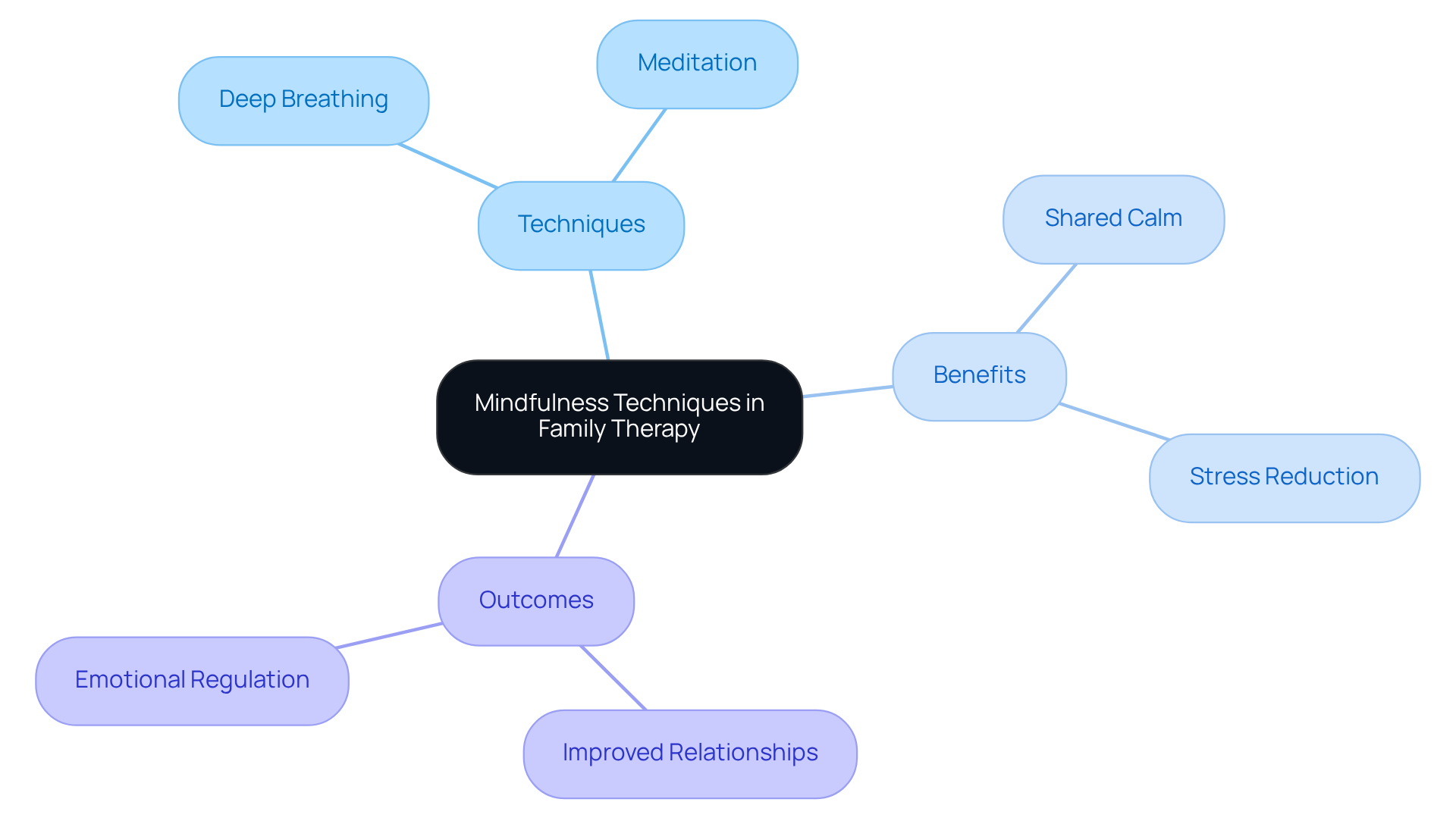
Multisystemic Therapy: A Holistic Approach to Family Trauma Recovery
Multisystemic Therapy (MST) utilizes family therapy interventions to offer a compassionate path to recovery by addressing the various systems that influence a household, including social, educational, and community dynamics. It recognizes that distress is not just an isolated event; rather, it intertwines with numerous external factors that shape family interactions and individual behaviors, which can be addressed through family therapy interventions. For overachievers, who often find it challenging to prioritize their own needs and may feel overwhelmed, MST provides a nurturing framework that fosters resilience and encourages healing.
As we explore this further, MST actively engages with these interconnected systems, creating a safe and trusting therapeutic environment. This space is essential for overcoming stigma and promoting personal growth in mental health. Have you ever felt overwhelmed by your past? Studies reveal that MST significantly reduces reoffending and improves household dynamics, highlighting the profound impact of addressing these broader contexts in trauma recovery.
Therapists underscore the importance of family therapy interventions as part of a multifaceted approach in achieving sustainable change. This empowers families to collectively navigate their challenges with the help of family therapy interventions, reinforcing the idea that healing is a shared journey. For overachievers, who may feel paralyzed by their experiences, this collaborative effort can be particularly transformative. Together, we can embark on a and understanding.
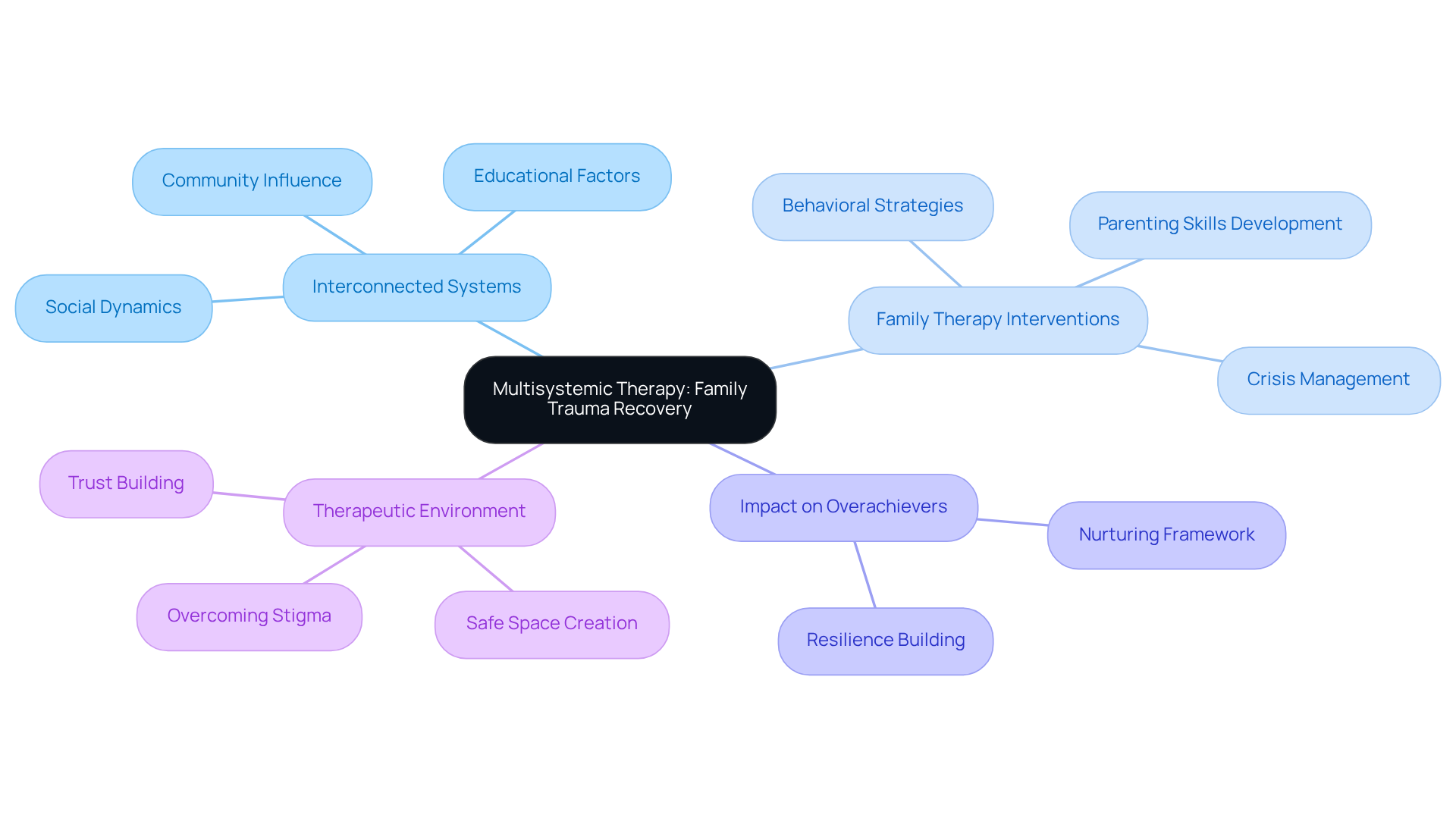
Conclusion
The journey of trauma recovery is profoundly influenced by the support and dynamics within a family. Tailored family therapy interventions not only provide a nurturing environment for healing but also empower families to work collaboratively through their challenges. By fostering open communication and understanding, these interventions create a foundation that is essential for overcoming the effects of trauma.
As we explore this further, various therapeutic approaches such as:
- Cognitive Behavioral Therapy
- Narrative Therapy
- Emotionally Focused Therapy
emerge as effective means to address trauma within family settings. Each method offers unique benefits, from restructuring negative thought patterns to enhancing emotional connections, ultimately reinforcing the idea that healing is a shared journey. Moreover, the importance of creative therapies like art and play therapy, alongside psychoeducation and mindfulness techniques, showcases the diverse tools available for families to navigate their recovery process.
In conclusion, embracing family therapy interventions is not just about addressing individual trauma; it is about cultivating resilience and fostering deeper connections within the family unit. Have you ever felt overwhelmed by your past? As families embark on this transformative journey, they are encouraged to explore these therapeutic options and commit to the process of healing together. The path to recovery is a collective effort, and with the right support, families can emerge stronger and more united than ever.
Frequently Asked Questions
What is The Emerald Couch and what services do they offer?
The Emerald Couch provides tailored family therapy interventions for trauma recovery in a compassionate and inclusive atmosphere, focusing on the unique needs of each household to foster healing and collaboration.
How does family therapy improve treatment engagement?
Research indicates that participating in family therapy significantly enhances treatment engagement, with each session attended increasing the likelihood of completing treatment by 1.4 times.
What role does Cognitive Behavioral Therapy (CBT) play in trauma recovery?
CBT helps individuals identify and reshape negative thought patterns stemming from trauma. It is effective in domestic therapy settings and can lead to significant improvements in trauma-related symptoms, including a 50% reduction in PTSD symptoms within three months of treatment.
How does CBT benefit families in therapy?
Families engaged in CBT often report enhanced communication and emotional support, which are crucial for recovery. This approach not only addresses individual struggles but also strengthens relational bonds, empowering families to confront challenges together.
What is narrative therapy and how does it aid in trauma recovery?
Narrative therapy allows groups to share and transform their experiences related to trauma, uncovering strengths and resilience. This method enhances emotional intelligence and improves communication among family members, fostering a supportive environment for recovery.
What is the significance of storytelling in narrative therapy?
Storytelling serves as a powerful tool in recovering from distress, enabling groups to reclaim their narratives and cultivate a sense of control over their healing journey, ultimately leading to a more unified family dynamic.




